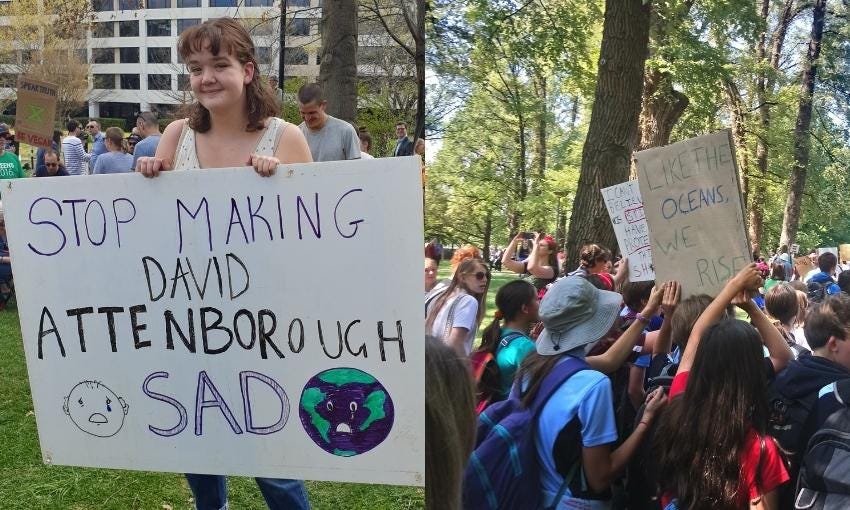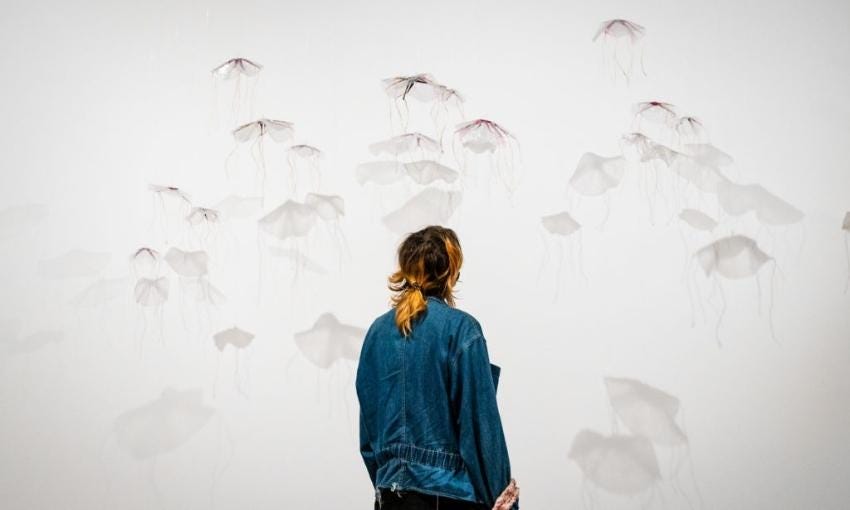The kids are alright
We often look to young people for hope when it comes to environmentalism. Is that fair?
Kia ora! Welcome to Future Proof, brought to you by Electric Kiwi.

When I was at high school, I joined a small group of classmates with posters taped to sticks, and marched through Hagley Park. Our goal was to raise awareness for the upcoming Earth Hour – an hour on a Saturday night in March where everyone was encouraged to switch off their lights. It was the first Earth Hour in New Zealand after the inaugural iteration in Sydney had been a success.
I look back today and cringe a little at my simplistic idea of “how to save the earth”. I probably thought that turning off the lights for an hour was going to actually make a difference to energy consumption. Of course, Earth Hour and our “march” were just symbolic gestures – useful in some way perhaps, but not the way I thought.
In 2019, I attended another environmental march while I was living in Canberra. I spent two sunny lunch breaks joining thousands of people at the School Strike for Climate. Teens wielded signs admonishing “fossil fools” and emblazoned with meme-worthy slogans like “yeet the rich”. It felt very different – electric – compared to that Earth Hour march from all those years ago.
The rangatahi shaping our environmental future
I look at today’s young people and their sophisticated understanding of environmental issues and their powerful organising and witty activism and I’m hopeful. Just this past week, I’ve read a listicle about five rangatahi shaping conservation in Aotearoa and a news story about teenage sisters who’ve developed a clever little wool contraption to stop fatbergs. Young people are writing fierce op-eds in national media, taking on the government over fossil fuel permits in court, and getting stuck into hands-on conservation work.
On social media, too, I find young people talking and learning and sharing stuff about sustainability and the environment – from the traingirlsummer TikTok which celebrates public transit and people-centric urban planning, to #CharliesChats savouring moments in nature on the Instagram of Te Korowai o Waiheke.
The problem with ‘youth-washing’
I guess part of getting older means looking at the enthusiasm and energy of younger generations and feeling optimistic. I certainly do. But then I think of Greta Thunberg’s fiery speech at the UN in 2019: “...you all come to us young people for hope. How dare you? You have stolen my dreams and my childhood with your empty words.” I’d never want to feel like I’m syphoning hope to quench my own feelings of climate anxiety. Telling kids they’re inspiring without actually taking action ourselves is disingenuous.
We’ve since seen a bit of a shift away from “youth-washing” – where children were seen but not really heard – to environmentalism that gives young people agency. We can’t place the burden of creating a better future – and present – squarely on the shoulders of youth. It’s my responsibility too, and yours, and the responsibility of our institutions, businesses and governments. So let’s really listen to young people and celebrate their achievements, and then back it up with some inspiring actions of our own.
Master your pool pump with Electric Kiwi’s MoveMaster
If you have a spa pool, chances are the cost of heating it is one of the major contributors to your power bill. Electric Kiwi's MoveMaster plan helps you limit that impact by offering half-price rates overnight (11pm-7am).
Making some small changes to your energy usage habits can be good for you and the environment.
Check out MoveMaster today and see how much you could be saving.
Australia sets new climate target
Across the ditch, the Aussies have passed their first climate legislation in more than a decade. The climate bill, which passed parliament last week, sets a 43% emissions reduction target (below 2005 levels) by 2030 as well as a net zero target by 2050. The minister for climate change will be required to provide yearly progress reports on meeting these targets. The new law prompted the Climate Action Tracker, which monitors climate legislation around the world, to upgrade Australia’s rating from “highly insufficient” to “insufficient”.
How does this compare to New Zealand’s emissions reduction targets? We have a mix of domestic and international targets and different timelines, which means it’s all a bit confusing. Our Climate Change Response Act sets a goal of net zero emissions (excluding biogenic methane aka cow farts) by 2050. Under the Paris Agreement, we’ve got a target of a 50% reduction on 2005 emissions by 2030 – which was updated from 30% in November last year. But according to the Climate Action Tracker, this still places us in the “highly insufficient” category.
The kaitiaki speaking up for ‘nationally critical’ Māui dolphins
Te Ao with Moana meets Davis Apiti, who has dedicated the last 22 years of his life fighting for the world’s rarest dolphin. This deep dive explores the complexities of the threats to Māui dolphins, which include fishing bycatch and the parasite-borne disease toxoplasmosis, as well as the potential for tikanga and mātauranga to light a path through these challenges.
Will King Charles III herald a monarchy with a stronger environmental voice?
In his former role as Prince of Wales, Charles was known for his advocacy on environmental issues. But with the monarch’s role being traditionally “non-political”, the Royal Family’s resident “eco warrior” will likely have to reign in his green opinions. Queen Elizabeth II was a tree enthusiast, and at the 2021 COP26 climate talks was caught on a hot mic admitting she was “irritated” by those who “talk, but they don’t do.” But others have suggested that King Charles III will elevate the environment more than his late mother, and make his mark as the Climate Monarch.
Ad bans to help the climate
The Dutch city of Harleem has banned public advertising of meat, holiday flights, fossil fuels, and vehicles that run on fossil fuels in a bid to reduce carbon emissions. This comes after France banned (some) fossil fuel advertising from the entire country last month. In 2021, Amsterdam became the first city to outlaw adverts for petrol-powered cars and gas-guzzling flights across its city centre and subway system. Last month, Sydney councillors voted to prohibit fossil fuel promotion at its events and on its properties. It’s clear this trend, which some compare to banning tobacco advertising for public health, is taking off. Could we see similar bans in New Zealand sometime soon?
Update on deep-sea mining
After last week’s edition hit inboxes, the mining company Nauru Ocean Resources Inc (NORI) announced it had received approval from the International Seabed Authority to proceed with a pilot collection of nodules from the Clarion Clipperton Zone in the Pacific. Around 3,600 tonnes of the metal-containing rocks are expected to be mined during the exploratory mission, which is set to begin later this month and will be overseen by independent scientists. Greenpeace has ”slammed” the “shock decision”, and called for world leaders to step in and declare a moratorium on deep sea mining. Meanwhile, a new paper by Finnish scientists argues that shallow sea mining – like the iron sand mining proposed for Taranaki – is not a sustainable alternative.
September is birthday month for The Spinoff. We’ve come a long way since 2014 and that is in no small part thanks to our members.
Their generous support underpins all our work and has meant we are able to cover more areas of life in Aotearoa, to tackle more stories about our people and issues impacting our communities. From our ongoing coverage of inequality and the cost-of-living crisis, to political reporting and our focus on te ao Māori, it’s important mahi and we can’t do it without you.
Let’s keep a good thing going – tautoko mai, donate today.
More stories:
Yes, doomscrolling – aka continuously soaking up bad news – is bad for your health. Here are four tips to kick your doomscrolling habit.
Innovative new tech deployed in some “experimental” new builds in Brisbane will slash power costs and emissions, by up to five tonnes of CO₂ every year.
Colourful underwater sponge gardens discovered off the coast of Wellington.
The benefits of biking to work: save money, save time and save the planet.
In a finding that will surprise no one, big oil companies are spending tonnes on climate-positive messaging, but very little on actual low-carbon activities.
Stuff’s climate editor Eloise Gibson and data journalist Kate Newton join forces for this great feature on why kids don’t bike to school so much any more – and how we can change that.
To end this edition, it’s cool to see a number of nature-inspired art exhibitions popping up around the country. At the Estuary Arts Centre in Orewa, 30 artists have created pieces around the Predator Free 2050 theme. And at the City Gallery in Wellington, ‘At Thresholds’ is an exhibition exploring the relationship between humans and other species. A recent exhibition at Two Rooms in Auckland catalogued New Zealand’s 107 extinct bird species; Catherine Woulfe spoke to the artist Dane Mitchell for New Zealand Geographic.
Kia pai tō wiki,
Ellen
PS–if you’re after some neat taiao kupu for Te Wiki o Te Reo Māori, check out these booklets, or Manaaki Whenua has some phrases related to manu!
Got some feedback about Future Proof or topics you’d like covered? Get in touch with me at futureproof@thespinoff.co.nz













